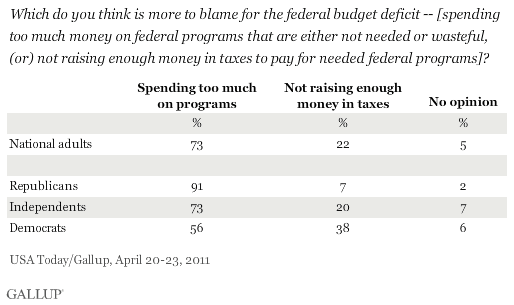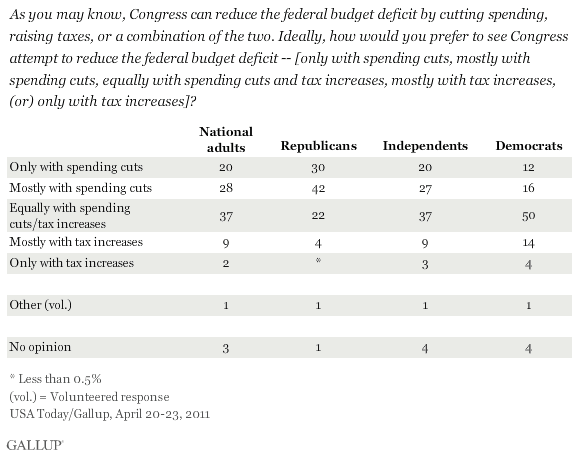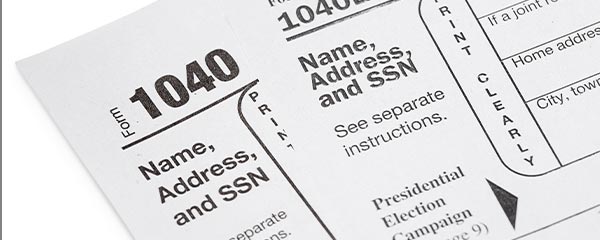PRINCETON, NJ -- The large majority of Americans say spending too much money on unneeded or wasteful federal programs is to blame for the federal budget deficit, while 22% say the deficit is a consequence of not raising enough in taxes to pay for needed programs.

These results are based on an April 20-23 USA Today/Gallup poll. Given a forced choice, Republicans almost uniformly place blame for the deficit on too much federal spending, rather than a shortage of tax revenue. Majorities of independents and Democrats agree, albeit by somewhat smaller margins.
Accordingly, Americans generally favor spending cuts rather than tax increases as the way for Congress to reduce the deficit going forward.

This question asks Americans to choose among five ways of reducing the federal deficit, ranging from a total reliance on spending cuts to a total reliance on tax increases. The responses cluster at the "spending cuts" end of the spectrum. About half (48%) of Americans say reducing the deficit should be done mostly or only with spending cuts. Another 37% say it should be done equally with spending cuts and tax increases. Eleven percent say mostly or only with tax increases.
Thus, overall, 85% of Americans explicitly favor spending cuts as at least part of the solution to reducing the federal deficit, with more than half of these favoring only or mostly using cuts. This compares with 48% who explicitly favor tax increases as at least part of a deficit reduction strategy -- a number consisting mostly of those who want an equal emphasis on spending cuts and tax increases.
The major partisan distinctions in response to this question reflect the choice between mostly/only spending cuts versus the equal use of spending cuts and tax increases. Republicans are most likely to favor the former; Democrats, the latter. Independents' views are between these two extremes. Relatively few Americans of any partisan identification favor mostly or only using tax increases to reduce the deficit.
Implications
Given a choice, Americans of all political persuasions are more likely to say that too much wasteful and unneeded government spending is the cause of the federal budget deficit, rather than too little tax revenue. Americans of all political persuasions also say cutting back on federal spending should be a major focus of efforts to reduce the deficit going forward.
Still, some emphasis on tax increases is part of the solution for almost half of Americans. Thus, it appears Americans would most likely tell their elected representatives to attack the federal deficit primarily using spending cuts, but with a secondary reliance on raising tax revenue.
Survey Methods
Results for this USA Today/Gallup poll are based on telephone interviews conducted April 20-23, 2011, with a random sample of 1,013 adults, aged 18 and older, living in all 50 U.S. states and the District of Columbia.
For results based on the total sample of national adults, one can say with 95% confidence that the maximum margin of sampling error is ±4 percentage points.
Interviews are conducted with respondents on landline telephones and cellular phones, with interviews conducted in Spanish for respondents who are primarily Spanish-speaking. Each sample includes a minimum quota of 400 cell phone respondents and 600 landline respondents per 1,000 national adults, with additional minimum quotas among landline respondents for gender within region. Landline telephone numbers are chosen at random among listed telephone numbers. Cell phone numbers are selected using random-digit-dial methods. Landline respondents are chosen at random within each household on the basis of which member had the most recent birthday.
Samples are weighted by gender, age, race, Hispanic ethnicity, education, region, adults in the household, and phone status (cell phone only/landline only/both, cell phone mostly, and having an unlisted landline number). Demographic weighting targets are based on the March 2010 Current Population Survey figures for the aged 18 and older non-institutionalized population living in U.S. telephone households. All reported margins of sampling error include the computed design effects for weighting and sample design.
In addition to sampling error, question wording and practical difficulties in conducting surveys can introduce error or bias into the findings of public opinion polls.
View methodology, full question results, and trend data.
For more details on Gallup's polling methodology, visit www.gallup.com.
